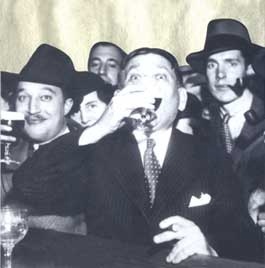Eighty-four years ago today, the US repealed Prohibition. Baltimore’s own H.L. Mencken was among the first to publicly celebrate the demise of the hated legislation:
Reason‘s Baylen Linnekin celebrates the federal anniversary, but points out that devolving powers to the various states hasn’t been quite a libertarian panacea:
[December 5th] will mark the 84th anniversary of the ratification of the Twenty-First Amendment, which repealed alcohol Prohibition. The repeal of Prohibition is worth celebrating, even if the amendment was (and remains) a deeply flawed vehicle.
The chief flaw with the Amendment is, as I wrote earlier this year, that it “simply shifted much of the power to prohibit and incessantly regulate alcohol from the federal government to the states.”
States have truly made the most of their teetotalitarian authority for decades, to the detriment of both alcohol producers and—much more so—consumers.
Much of the negative impacts of states’ approach to alcohol regulation can be tied to what’s known as the three-tier system, a Prohibition relic under which states generally prohibit direct alcohol sales from a brewer, vintner, or distiller to a consumer. The three-tier system mandates these alcohol producers first sell to a distributor or retailer — a mandatory middleman — who can then sell to actual drinkers.
Laws that require this approach create a host of problems, including, for one, that they drive up consumer costs dramatically and needlessly. States’ plenary control over alcohol has been controversial for decades, as this 1987 article in the Journal of Public Health Policy makes clear, noting that “the idea of a government monopoly of a consumer product seems odd and even bizarre[.]”
Great arguments in favor of scrapping the dreaded three-tier system are often countered by those who claim doing so will bring about the end of days, or worse.
Reposted from 2013:
ReasonTV
Published on 5 Dec 2012In honor of Repeal Day, which celebrates the end of America’s “noble experiment” in banning alcoholic beverages, Reason TV is happy to introduce you to George Cassiday, a man whose life and work should be taught to every schoolkid — and to every member of Congress hell-bent on legislating the nation’s morals.
From 1920 through 1930 — the thick of the Prohibition era — Cassiday supplied illegal liquor throughout the halls of Congress. Known as “The Man in the Green Hat,” Cassiday was the Capitol’s highest-profile bootlegger, with a client list that included senior members of the Republican and Democratic Parties. How instrumental was he to the D.C. power elite? He even had his own office in the House and Senate office buildings.
Cassiday gave up the liquor trade after his arrest in 1930, but gained notoriety by penning a series of front-page articles for The Washington Post about his days as Congress’ top bottle man.
Though he never named names, Cassiday’s stories detailed every aspect of his former business — and the depths of hypocrisy in Washington. By his own estimation, “four out of five senators and congressmen consume liquor either at their offices or their homes.” Appearing days before the 1930 mid-term elections, Cassiday’s revelations caused a national stir and helped sweep pro-Prohibitionist — and ostensibly tee-totaling — congressmen and senators out of power.
Today, with the rise of cocktail culture and prohibition-vogue in full swing, Cassiday’s life and legacy are being re-discovered. Through books such as Garrett Peck’s Prohibition in Washington, D.C.: How Dry We Weren’t to New Columbia Distillery’s Green Hat Gin, the remarkable story of George Cassiday — “The Man in the Green Hat” — is again being told.
Reason TV spoke with Cassiday’s son, Fred, author Garrett Peck, and New Columbia Distillery’s John Uselton to discuss George Cassiday and the end of Prohibition.




